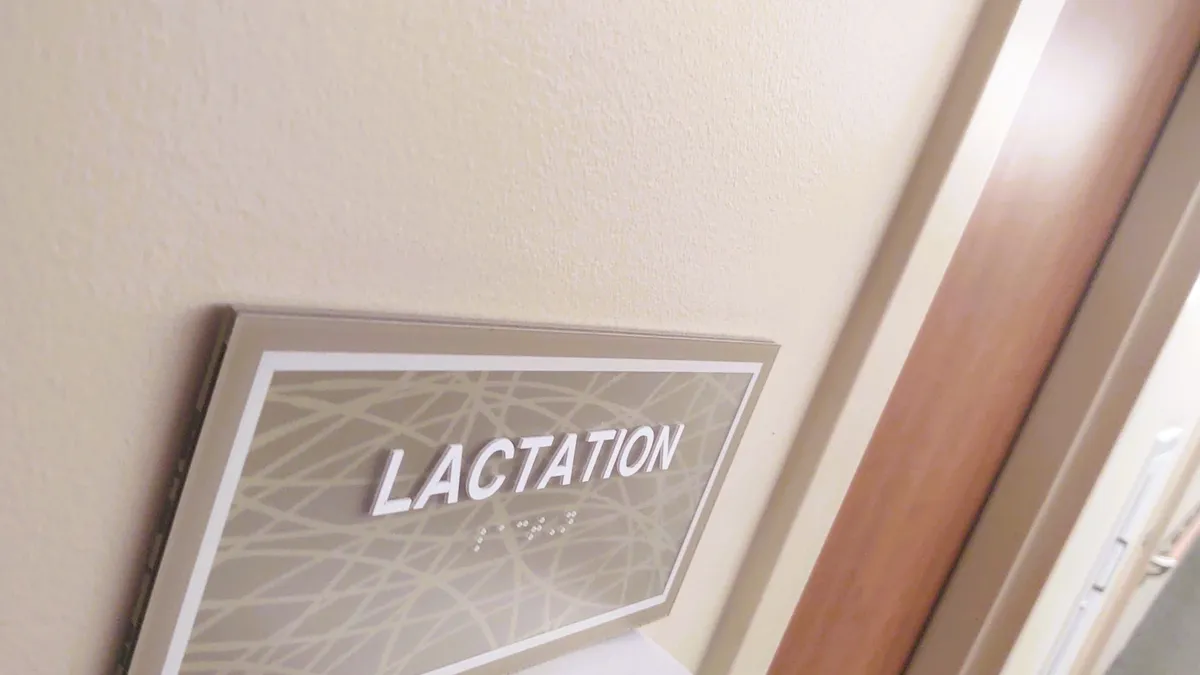Dive Brief:
- New York employers must provide employees who choose to express breast milk in the workplace with a room or other location to do so, according to a law signed into effect Dec. 9 by Gov. Kathy Hochul.
- Per the law, the location must be in close proximity to the work area, well lit, shielded from view and free from intrusion from other people in the workplace. Employers also must provide a chair, a working surface, and access to clean, running water. Access to an electrical outlet and refrigeration also must be provided if the workplace has access to these amenities.
- The room or location may not be a restroom or toilet stall. If compliance would pose an undue hardship on an employer, that employer must make reasonable efforts to provide a private space in which an employee may express breast milk, per the statute. Employers also must develop a written breastfeeding policy to be given to each employee upon hire and to those returning to work following childbirth. The law is set to take effect 180 days after enactment.
Dive Insight:
New York’s new law aims to ensure nursing mothers have access to “safe, hygienic and convenient” pumping spaces at work, Hochul said in a statement announcing the law’s signing; "By requiring employers to provide quality accommodations, this legislation will help employees feel comfortable and respected when breastfeeding."
The state’s requirements add onto existing requirements at the federal level as mandated by the Affordable Care Act, which amended the Fair Labor Standards Act in 2010 to require covered employers to provide break time for employees to pump as well as spaces other than bathrooms in which to do so.
At least 30 states — as well as Washington, D.C., Puerto Rico and the U.S. Virgin Islands — have laws that govern breastfeeding in the workplace, according to the National Conference of State Legislatures. New York’s law is similar to provisions in states like California, which in 2019 passed a law requiring employers to provide access to a lactation room or location with access to a sink and refrigerator in close proximity to the employee’s workspace.
Access to breastfeeding accommodations still eludes a considerable number of U.S. workers. A 2019 report by the Center for WorkLife Law estimated that 27.6 million female workers lacked basic protections such as break time, space and a right to receive other reasonable accommodations that would allow them to continue breastfeeding. The same report also noted that despite federal and state protections, discrimination persists against workers who breastfeed.
Such conduct can prove costly for employers. In 2019, an Arizona jury awarded a nursing mother who worked for a fire department $3.8 million after she alleged that her employer failed to provide her with an appropriate lactation room on a consistent basis and retaliated against her. In 2020, Bank of America agreed to adopt workplace changes following a U.S. Department of Labor investigation that found one of the company’s locations failed to provide reasonable break time and space free from intrusion for nursing mothers.
Employers may choose to go beyond legal requirements to ensure that employees have the ability to breastfeed comfortably at work, sources previously told HR Dive. For example, they can help form support groups for affected employees and set expectations for managers and colleagues. Some experts have suggested designating a point person who is responsible for making sure that employees preparing for childbirth understand the resources available to them upon their return to work.













